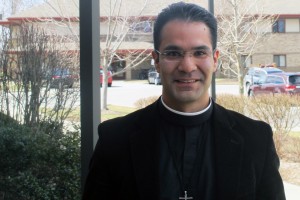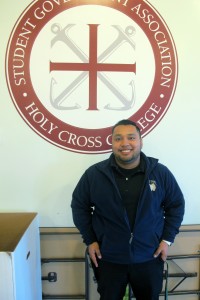Two Indiana Colleges Create Scholarships For Undocumented Students

Brother Jesus Alonso is an administrator at Holy Cross College in South Bend, and advocates for resources to help undocumented students go to college. (Photo Credit: Claire McInerny/StateImpact Indiana)
One afternoon on his way to work, Juan Constantino’s headlight went out.
“I had no idea,” Constantino recounts. “A cop pulled a U-turn, pulled me over he said, ‘do you know why I pulled you over?'”
If Constantino were like most students, it wouldn’t have been a big deal. He probably would have been let off with a warning and told to get his light fixed. But Constantino isn’t like most students. He’s undocumented and that means he didn’t have a driver’s license.
Constantino was charged with a misdemeanor. His family gathered the money quickly and posted his bail. Constantino went home, finished his homework and went to school the next day.
For undocumented students like Constantino, the threat of deportation is always present, and creates barriers to receiving an education.
- Two Indiana Colleges Create Opportunities For Undocumented StudentsWabash College and Holy Cross College in Indiana are partnering with a charter school network in Chicago to create scholarships for undocumented students.Download
For example, paying for college is almost impossible. Without legal status, their parents often work low wage jobs, and without a social security number the student can’t apply for federal loans.
Wabash College and Holy Cross College in Indiana are trying to tear down some of those barriers by creating scholarships specifically for undocumented students.
Living In The Shadows
Since he and his family arrived in South Bend from Mexico 16 years ago, Constantino has kept many details about his life a secret. His friends at school didn’t know he was undocumented. Many didn’t even know he was born in Mexico.
Fortunately, one of his high school teachers had a hunch. One day, he pulled Constantino aside told him about an opportunity at Holy Cross College in South Bend.
“He said ‘hey, there’s a scholarship, it’s for a Latino male…who’s in good standing, who’s done community service, who’s part of the St. Albert’s Church, and is undocumented,” Constantino says. “Do you qualify?’”

Juan Constantino is a junior at Holy Cross College. As an undocumented student, he didn’t qualify for federal aid or many loans, and a scholarship offered by Holy Cross was the only way he can attend college. (Photo Credit: Claire McInerny/StateImpact Indiana)
Constantino qualified, but he couldn’t quite believe a college would openly accept and support an undocumented student like himself.
Brother Jesus Alonso, an administrator at Holy Cross, says helping those in need is the mission of the school, and immigration status doesn’t change that.
“People in need can vary in circumstance and situations,” Alonso says. “We happen to be a school of Catholic higher education, we have a resource of education, and we want to make that accessible to students regardless of their financial or other needs.”
Paving The Way To A Diploma
Holy Cross is partnering with the Noble Network of Charter Schools out of Chicago to expand its efforts to enroll students like Constantino.
The partnership will allow both Holy Cross and Wabash College to enroll three undocumented students from Chicago at their institutions, providing the students with almost a full ride.
Scott Feller, Dean of Wabash College, says he is excited to expand the student population. He says putting aside the politics around immigration and looking at these students as any other teenager makes it obvious that helping them is the right thing to do.
“The fact is they’re 18 years old now and this is a time in their life that can’t be wasted,” Feller says. “We can’t really wait for them to become documented, and so we’re going to do our best to use these critical years between 18 and 22 to bring them here to this community.”
[pullquote]We need to make it known how important it is that we have this freedom, a freedom that we weren’t being punished for something we didn’t do. I didn’t choose to come here at the age of two or three – Juan Constantino[/pullquote]Many undocumented students qualify for Deferred Action for Childhood Arrivals, or DACA, a federal program created under President Obama that allows them to work and live in the U.S. for two years. They can renew it every two years, but Juan Constantino and many other undocumented students worry that once a new president is elected, DACA could disappear, leaving them with a college diploma but no opportunities to work.
Typically, DACA students aren’t the target for immigration officials, but not having the security of citizenship leaves a lot of uncertainties. That’s why Canstantino feels lucky to have found Holy Cross.
“We’re undocumented students that are fortunate enough to have an education,” he says. “I think we need to make it known how important it is that we have this freedom, a freedom that we weren’t being punished for something we didn’t do. I didn’t choose to come here at the age of two or three.”
Wabash and Holy Cross are two of the twelve schools participating in the partnership with Noble Network of Charter Schools.